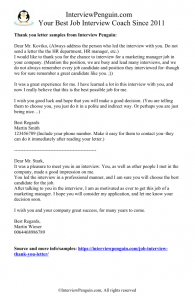So the interview is over. You did well, or perhaps you made a mistake or two. But what’s next? Should you wait for a call from an employer? Should you call them back? One of the least obtrusive ways of following up an interview is sending a short thank you letter. No pressure. No deadlines. Nothing personal. No phone calls. Just a short note, thanking them for their time and effort in an interview. Long text is not always necessary.
Once you send a thank you note, it is a clear sign to the employer that you still want the job, after everything that has happened in an interview. And you don’t even have to mention it on your letter. If you weren’t interested, you simply wouldn’t send it… It is clear to everyone, including your future employer.
More than a formality
Actually, a thank you letter (or note) is not only a formality, something you should send because it is polite to do it, or because it belongs to the interview etiquette in your country. A good letter can help you to make one final push and get the job.
We wrote two sample letters, to make it easier for you to craft one. Read the information in the brackets to understand why we included (or not included) something in the text.
Samples of thank you letters
Dear Mr. Koviko, (Always address the person who led the interview with you. Do not send a letter the the HR department, HR manager, etc.)
I would like to thank you for the chance to interview for a marketing manager job in your company. (Mention the position, we are busy and lead many interviews, and we do not always remember every job candidate and position they interviewed for–though we for sure remember a great candidate like you. ;))It was a great experience for me. I have learned a lot in this interview with you, and now I really believe that this is the best possible job for me.
I wish you good luck and hope that you will make a good decision. (You are telling them to choose you, you just do it in a polite and indirect way. Or perhaps you are just being nice…)
Best Regards
Martin Smith
123456789 (Include your phone number. Make it easy for them to contact you–they can do it immediately after reading your letter.)
Special Tip: Download two sample thank you letters in a PDF, and use it as an inspiration for your own letter:

Second sample letter
The second letter is a bit different. It is more informal, and you should use it especially if your interview went well, if you managed to create a good connection with the interviewer. Anyway, any letter is better than none. Choose one of our examples, or follow your intuition and impression you had in an interview, while composing your own version of a thank you note.
Dear Mr. Stark,
It was a pleasure to meet you in an interview. You, as well as other people I met in the company, made a good impression on me.
You led the interview in a professional manner, and I am sure you will choose the best candidate for the job.
After talking to you in the interview, I am as motivated as ever to get this job of a marketing manager. I hope you will consider my application, and let me know your decision soon.I wish you and your company great success, for many years to come.
Best Regards,
Martin Wieser
0064468986789
Conclusion
It is easy to send a thank you letter, and you can find many good samples online (or you can use your creativity and compose your own unique letter).
Sending a letter, you can not lose anything (unless you make ten grammar mistakes in the text). It can only help you to strengthen the connection with the interviewer, and to get a job at the end of the hiring process.
And if it doesn’t pan out, if your letter brings no answer, at least you will know that you tried your best. It is always easier to accept failure when we know that we did all we could do to succeed…
Other articles that may interest you
- Interview follow-up call – Most of the time you will not have the phone number of your interviewer. But if you get it (can happen in an agency, or in small and middle-sized companies), calling them is a great idea. A phone call offers much more flexibility than an email. Even if their answer is negative, you can ask them for the feedback, which can help you to prepare better for your next interviews
- Most common interview questions – Why should we hire you? What motivates you in work? What are your weaknesses? Where do you see yourself in five years from now? Why did you leave your last job? Learn how to answer all tough interview questions…
- One week after an interview and no response – What does it mean?

